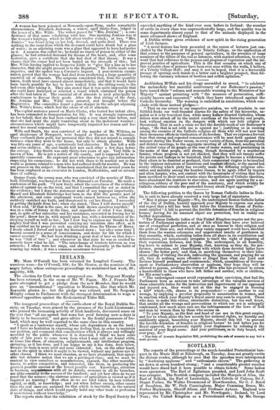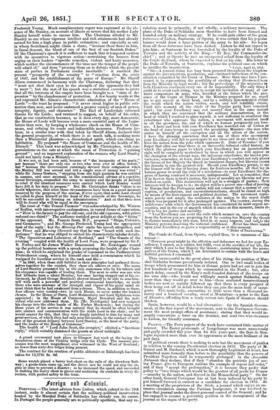SCOTLAND.
The reports of the proceedings at the much-heralded Protectionist ban- quet in the Music Hall at Edinburgh, on Tuesday, does not greatly excite the distant reader, although he sees that the speeches were interspersed by " deafening applause " and " enthusiastic cheers." The gathering is set down at seven hundred strong ; "and a oonsiderably greater number would have dined had it been possible to obtain tickets." Some ladies were spectators. The Earl of Eglintoun presided, and Lord John Scott was croupier. The Scottish company included the Marquis of Ailsa, the Earl of Selkirk, the Earl of Lauderdale, Lord Colvile of Culross, Sir J. Stuart Forbes, Sir Walter Drummond of Havrthornden, Sir G. J. Baird of Saughton, Sir W. Dick Cunningham, Major Cumming Bruce, Mr. Forbes Mackenzie, Sheriff Alison, and Professor Aytoun. England was represented by Mr. Christopher and Mr. Newdegate ; Ireland, by Lord Naas ; the United Kingdom as a Protectionist whole, by Mr. George
Frederick Young. Much complimentary regret was expressed at the ab- sence of Mr. Stanley, on account of illness so severe that his mother Lady Stanley herself wrote to excuse him. The Chairman alluded to Mr. Stanley as one whose vigorous intellect and rich attainments had already earned for him a high place in public estimation; and especially as one
in whom Scotchmen might claim a share, "because there flows in him, in lineal descent, the blood of one of the first of our Scottish Dukes." Of the Chairman's speech it is sufficient to mark that it tempered caution with its incentives to vigorous action—restraining the hearers from urging on their leaders "specific remedies, violent and hasty measures, which neither the circumstances of the time nor the temper of the people will admit of," and from "pressing them on to defeats which the present state of parties in Parliament render inevitable " : it ascribed the present "prosperity of the country " to " reaction from the crisis of 1847, and the establishment of the peace of Europe." Mr. Sheriff .Alison commenced in harmony with the Chairman, declaring that they " must not shut their eyes to the strength of the opponents they had to meet "; but the rest of his speech was a statistical exercise to prove that all the interests of the empire have been brought to a "state of de- pression " by the abandonment of protection. A few hearty words at the end expressed Mr. Alison's characteristic admiration of the " House of Lords "—the toast he proposed : " it never stood higher in public esti- mation than now, and never embraced a greater variety of men of power, integrity, dignity, and character." The Earl of Lauderdale returned thanks for the Lords; and ventured to suggest, on behalf of his order, that as our constitution becomes, as it does every day, more democratic, the House of Lords will become even a more essential part of the Legis- lature than now, by keeping a wholesome check on the House of Com- mons, and refining its crude and indigestible measures. Professor Ay- toun, in a similar tone with that taken by Sheriff Alison, declared that the general prosperity, of which there is so much talk, is nothing more than a Ministerial phantom—a disembodied spirit, which can claim no habitation. He proposed "the House of Commons and the health of Mr. Disraeli." This toast was acknowledged by Mr. Christopher, with con- gratulations on the rate at which the cause of Protection is "gaining ground" ; and an improved explanation of the reasons why Lord Stanley could not lately form a Ministry— It wee not, as had been said, because of " the incapacity of his party," nor because " there are only one or two who were ever in office before," but " because the Government cunningly devised their resignation when the Mutiny Bill was unread and not a single sum of money was voted" ; while Sir James Graham, " stepping from the high position he was entitled to assume, and once assumed, as the constitutional adviser of a constitu- tional Sovereign, counselled the army to mutiny and the people of Ireland to rebel if the identical measures were carried which Lord Stanley would have felt it his duty to propose." But Mr. Christopher thinks " there is no doubt 'whatever that since these circumstances have been in a groat measure removed by the progress of the session, if ever again that noble Lord should be called to place himself at the head of the councils of the Sovereign, he will be successful in forming an Administration." And at that time men will be found who will be equal to the emergency. The toast of "the Tenant Farmers" was acknowledged by Mr- Watson of Keillor, with interrogative exclamations, in varied forms of expression, —"How is the farmer to pay the (admit, and the old expenses, with prices freducedone-thirdl" The audience testified great delight at this " fixing" of the opponent. Mr. Francis Scott, M.P., proposed "Ships, Colonies, and Commerce" ; and Mr. George Frederick Young had the appropriate task of the reply: but the .Morning Post omits his speech altogether, and the Times and Morning Chronicle say that he was "heard with such im- patience" that he was obliged to curtail his characteristic tabular details. " The Operatives and Labourers of Scotland," and " The Guests of the evening" coupled with the health of Lord Naas, were proposed by Sir F. S. Forbes and Sir James Walker Drummond. Mr. Newdegate wound up the political business with a speech proposing the health of the Chair- man; in which he explained the grades of command in the Parliamentary Protectionist camp, where he himself once held a commission which he resigned for humbler service in the rank and file- " 1846, when those still faithful to their principles had gathered them- selves together for the combat, they chose six officers at once. The name of Lend Stanley presented his as the only statesman who by his talents and his eloquence was capable of leading them. The next in order was one who had hitherto been a silent Member, but once having stepped out of his re- tirement, he (Lord George Bentinck) showed himself to be able to arm him- self with such a powerful and practical commercial knowledge, as made those who were unaware of the strength and vigour of his great mind al- most think that he had awakened from a dream. Then, in addition to these, four officers were needed—two in each House, to serve under the leaders chosen. In the House of Peers, Lord Malmesbury and Lord Eglintoun were appointed ; in the House of Commons, Major Beresford and the indi- vidual who now addressed them. He (Mr. Newdegate) had now resigned his charge into the abler hands of Mr. Forbes Mackenzie ; but during the three years of his service it was natural that he should be often brought into contact and communication with the noble Lord in the chair; and he would answer for this, that they were deeply indebted to him for many and great services, of which they had only seen the results, in the conduct of mat- ters of the greatest delicacy between Lord Stanley, as the head of the party, and the leader of the House of Commons."
The health of " Lord John Scott, the croupier," elicited a "facetious reply," which suitably dismissed the guests at about midnight.
A grand ceremonial took place in Glasgow last week at the laying the foundation-stone of the Victoria bridge over the Clyde. The masonic pro- cession was the most magnificent ever witnessed in tho West of Scotland ; no fewer than sixty-five lodges being present.
The contract for the erection of public abbatoirs at Edinburgh has been taken for 12,9781. fk.
Some wretch placed a heavy tool-chest on the rails of the Aberdeen Rail- way ;. a goods-train came up, and the driver saw he could not stop the en- gine in time to prevent a disaster; so he increased the speed, and succeeded in dashing the heavy chest to pieces and scattering its contents in every di- rection, with perfect safety to the train.



























 Previous page
Previous page